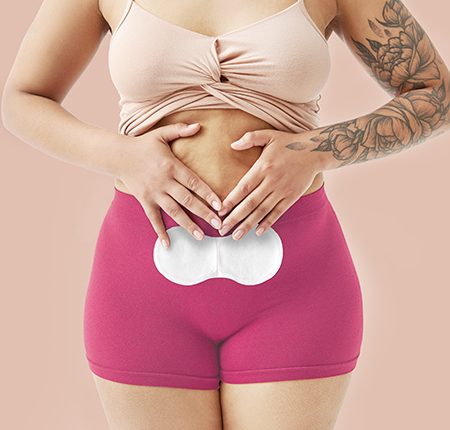
Dysmenorrhea - What is it and how to get rid of menstrual pain?
As a woman, surely at least once in your life you have experienced a pain in the lower abdomen during menstruation. Ranging from an uncomfortable sensation that goes away on its own to an acute pain that won't leave you alone for days on end, dysmenorrhea cannot be permanently treated, but there are ways to reduce symptoms. Pain that is difficult to bear or the appearance of other symptoms that we tell you about in detail below, are signs that announce that it is time to pay a visit to your doctor. We're telling you right now everything you need to know.
What does dysmenorrhea mean?
Often, menstruation is accompanied by symptoms such as headaches and cramps. These manifestations can be an important indicator of our state of health, so it is important to differentiate common pain from that which announces that you are facing problems.
Dysmenorrhea is the medical term used for menstrual pain, which varies in intensity from woman to woman. Cramping can start one to two days before the actual bleeding and usually continues for the first two days of the cycle.
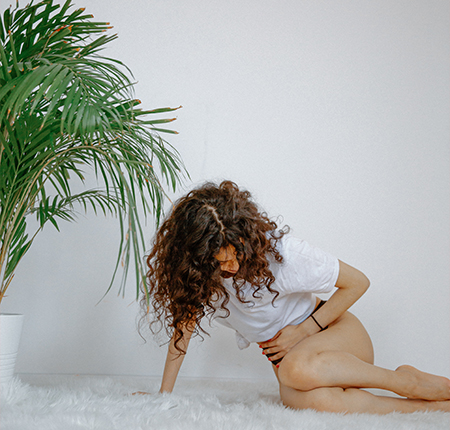
Why do menstrual pains occur?
Menstrual pain mainly affects women between the ages of 15 and 25 and occurs in about 50% of them. Usually, the most intense pain occurs in the next two years after you had your first period. With advancing age, they may decrease in intensity and even cease permanently after the first birth.
What actually happens to our body during those pains? When we menstruate, our bodies secrete hormones called prostaglandins that cause the uterus to contract to help shed the endometrial lining. Basically, if the contractions of the uterus are too strong, they can put pressure on the blood vessels in the area, which blocks the transport of oxygen to the muscle tissue in the abdominal area. This lack of oxygen leads to menstrual cramps. 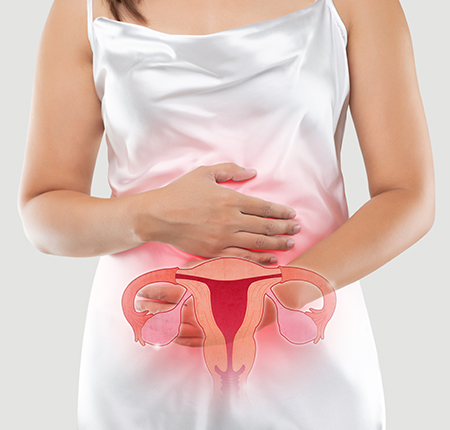
A high level of prostaglandin hormones is often associated with severe menstrual pain
Types of dysmenorrhea
Menstrual pain that occurs only during menstruation is known as primary dysmenorrhea, while secondary dysmenorrhea can occur due to diseases of the genital system. We now discover the important differences between the two types.
Primary dysmenorrhea
Primary dysmenorrhea is the most common type of menstrual pain, they are recurrent and are not caused by other diseases. The pain is felt one or two days before menstruation or with menstrual bleeding, in the lower abdomen, back or thighs. The intensity of the pain varies between moderate and severe, lasts between 12 and 72 hours.
Specific symptoms include nausea, vomiting, diarrhea or fatigue. Primary menstrual pains decrease in intensity once you get older or after you have had your first pregnancy.
Secondary dysmenorrhea
Secondary dysmenorrhea refers to pain caused by a condition in the female reproductive system or an infection. Menstrual pains of this kind start early in the menstrual cycle and may last longer than the primary ones.
Symptoms that are a red flag include: pain during intercourse, bleeding during or after intercourse, difficulty getting pregnant, constipation, foul-smelling vaginal discharge, frequent urination, fever or bleeding between periods, nausea, extreme fatigue.
Causes of Dysmenorrhea
In the case of primary dysmenorrhea, the cause is common most of the time: prostaglandin secretion is high, and for this reason the uterus contracts strongly. Cramps are painful, but once the first days of the menstrual cycle pass, they become less frequent and less intense.
Secondary dysmenorrhea is a more complicated story. This is caused by some conditions and diseases of the reproductive system, including:
Endometriosis - portions of the tissue lining the uterus grow outside the uterus;
Adenomyosis - the tissue that lines the uterus grows inside the muscle of the uterus;
Pelvic inflammatory disease - is caused by a bacterial infection that can develop in the uterus, affecting other organs of the reproductive system;
Cervical stenosis - narrowing of the opening to the uterus;
Fibroids (benign tumors) - which can grow on the walls of the uterus.
general details, we mention causes for both primary and secondary dysmenorrhea + the list of causes (eg: endometriosis, inflammation, etc.)
Causes menstrual pain without menstruation
Can you have abdominal cramps outside of your period? In specific situations, yes, and here are some of the causes:
premenstrual syndrome - pain may appear a few days before menstruation due to the release of estrogen and progesterone;
pregnancy - it is normal to experience abdominal pain without menstruation;
thyroid gland disorders;
intense physical exercise;
treatment with contraceptives;
stress;
polycystic ovary syndrome, which we also wrote about HERE;
urinary tract infections;
uncomfortable sexual positions or deeper penetration;
ovarian cancer.
So, if you experience excruciating pain during or outside of your period, talk to a doctor to make sure everything is fine and there's nothing to worry about.
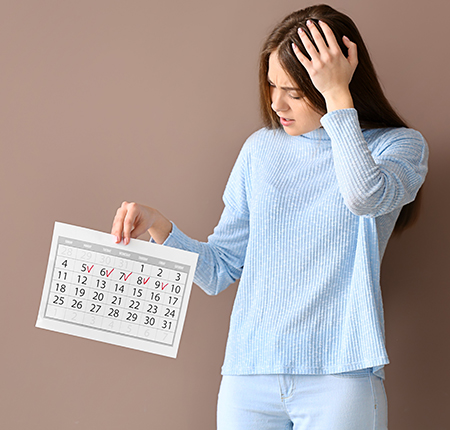
Causes of menstrual pain pregnancy
Cramps can be a sign of pregnancy. They can be felt in the abdominal area lower than usual and can persist during the first few weeks of pregnancy.
Although it may seem strange, menstrual-like cramps are also common towards the end of pregnancy! So, if you're in your third trimester and you're feeling that kind of pain you haven't had in a long time, don't worry! During this period, the fetus grows very quickly, and the body does everything it can to adapt.
If you're wondering what other signs your body sends to let you know you're pregnant, or if you simply want to know more about yourself and your body, you must read the article I prepared for you HERE.
Symptoms associated with dysmenorrhea
Pain associated with menstruation usually peaks 24 hours after the start of the menstrual cycle and should disappear after 2-3 days. The pain is either sharp or dull, constant and sometimes it can even extend to the lumbar area or legs.
Other symptoms that can accompany dysmenorrhea are:
nausea
headaches
dizziness
vomiting
diarrhea/constipation
bloating
feeling dizzy
mood swings
Menstrual pain - Risk factors
Although menstrual cramps are normal, it's important to pay attention to how your period symptoms change from month to month. It is good to know that the risk of having menstrual pain increases when:
Women are under the age of 30;
Puberty started early (at 11 years or earlier);
Menstrual flow is abundant;
Menstrual bleeding is irregular;
You smoke;
You consume caffeine in excess;
Total lack of physical effort;
Emotional stress, depression or anxiety occurs;
You've never gotten pregnant;
You've been on a diet or diet.

Can intimate hygiene products aggravate menstrual pain?
As if hormonal imbalances and changes in the body were not enough, many of the feminine intimate care products on the market are doing us more harm than good. This is caused by all the chemicals, dioxins, chlorine and plastic added to the products we rely on to protect our intimate health, every day.
If you're dealing with frequent inflammation, infection or irritation, it's very possible that the absorbents or tampons you're using are unbalancing your pH and messing up the bacterial flora of your intimate area. If Candida is bothering you or itching is a real problem for you, your intimate gel is probably not taking proper care of your body. If the products you use in your intimate area smell nice, that means they're using fragrances and that's a real sign of concern. Even period pain (dysmenorrhea) can be amplified if your vulva comes into contact with chemicals that make it sick. 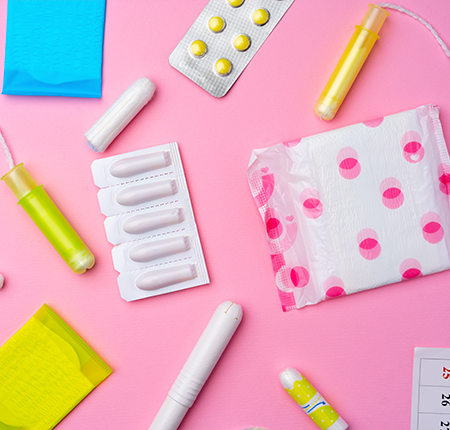
I had big problems on my menstrual days, absorbents from the store caused me terrible irritation, and intimate care products as well, I was desperate! But then my mom recommended ENROUSH, which are the friendliest brand I've seen, since I tried it for the first time I haven't had any irritation! Love love love!
RUCSANDRA-IOANA
If it seems that discomfort has become the new normal, discover how with organic, 100% natural care, all your problems disappear. At Enroush we have created the clean formula with no traces of chemicals, no plastic or synthetic fibers, all to keep your health safe while you enjoy the comfort you need every day. Menstruation is no longer a pain, the pain is less and you can say goodbye to infections, inflammations and unpleasant sensations. It's time to try ENROUSH.
Strong menstrual pains - When should we go to the doctor?
Over time, you get to understand your body better and differentiate between what is normal and what is abnormal for you, especially when it comes to menstruation. As each of us is unique, the answer to the question "When should I go to the doctor?" cannot have a single answer.
There are some signs that it is good to pay attention to and, when you notice them, consult a doctor:
The anti-inflammatory pills you usually use stop working;
Pain persists for more than 72 hours;
Cramps are accompanied by high temperature (fever);
Intense pains appear for the first time after the age of 25.
The most important thing is to keep in mind that a visit to the doctor does not mean a worrying diagnosis, but actually means taking care of yourself and your health.
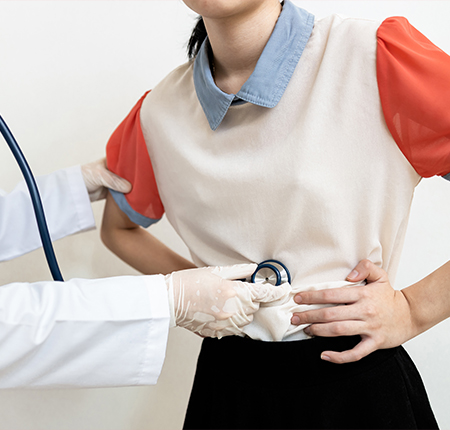
Diagnosis of dysmenorrhea
Diagnosing, especially when we try to do it ourselves, can be tricky. That is why it is good to turn to a specialist when we feel that something is not right.
When the pain is acute and long-lasting, it is necessary to visit the gynecologist's office for diagnosis and treatment. In addition to the usual gynecological consultation, the doctor may recommend the following investigations:
pelvic ultrasound - examination of the pelvis using ultrasound;
MRI - this examination has a sensitivity of 93% and a specificity of 97% in the diagnosis of malignant gynecological tumors;
laparoscopy - surgical procedure in which the abdominal or internal genital organs are examined;
hysteroscopy - minimally invasive method, through which the uterine cavity, cervix, vagina and tubal openings are explored and operated.
Treatment - How to get rid of menstrual pain?
When we talk about treating common menstrual cramps, i.e. primary dysmenorrhea, we can use anti-inflammatory drugs that help reduce pain. It is best to ask the doctor's opinion to be sure that we are making the right choice for us.
If the doctor discovers more complex problems, such as secondary dysmenorrhea, he may recommend the use of certain contraceptives. They contain hormones that prevent ovulation and thus reduce menstrual pain.
Both primary and secondary menstrual pain can be treated, so don't put off seeing your doctor or take medication without your doctor's approval. However, we have one more tip for you.
We live in the age of innovation and now you can truly choose what is best for your body. The concrete example is our very best friend during menstruation, the hot water bottle, which has relieved our pain in countless moments and which has never let us down. That's the truth, heat therapy is therapy for the soul too, not just for period pain because it gives us the sense of safety and comfort we so desperately need on those red days. But you just can't stay in bed all day with the bottle next to you, can you?
Menstruation doesn't have to put your life on hold, and Enroush is here for you with the solution. MENSTRUAL PADS become your best friends because no matter the moment, no matter the place, you apply one to your underwear and you can continue your day peacefully.
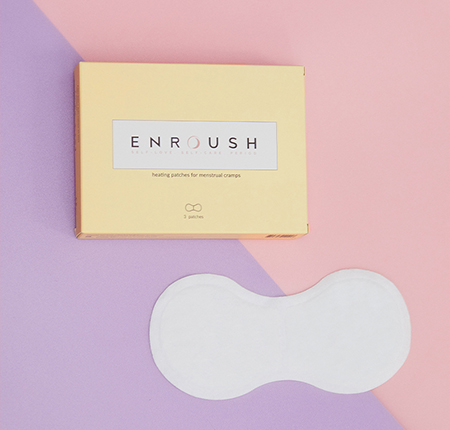
They're so thin that no one will notice you're wearing them, and you'll feel the warmth you need to ease menstrual cramps. The ingredients in the composition of the patches are 100% natural (after use you can add the contents to the plant pot), they activate in the air and have an effect for up to 8 hours. Bye-bye pills, hello ENROUSH happy life!
Menstrual pain remedies
Do you feel like you need more in those painful moments? Don't forget that you can also try to relieve menstrual cramps...
a warm bubble bath and your favorite music
physical exercises to relax the muscles (Kegel or even yoga)
Abdominal massage (with or without essential oils)
rest
fruit and vegetable consumption
avoiding coffee and salty foods
stress reduction and absolute relaxation of the body

Dysmenorrhoea complications
Primary dysmenorrhea usually does not create other complications. Specifically, cramps are felt during menstruation and then pass. Instead, they can affect your quality of life, turning daily tasks into a real burden, so take things easy and give yourself time to recover.
Regarding secondary dysmenorrhea, abdominal pain that is also related to other organs in the reproductive system can lead to various conditions, such as adenomyosis and endometriosis, diseases that can impact your health. Be sure to visit a doctor when symptoms are worrisome or even when you simply notice changes in the way you feel when you're on your period.
Prevention of menstrual pain
And yet, is there anything we can do to prevent the discomfort of menstrual pain? We have some ideas for you:
Exercise regularly, even when you're on your period.
Quit smoking.
Make sure you go for a regular check-up with your doctor.
Hydrate yourself properly.
Choose to have a healthy diet and avoid caffeine, alcohol.
Rest as much as you need.

